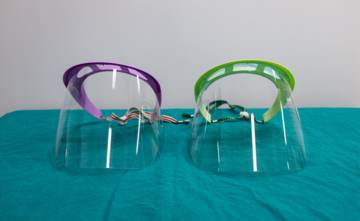We have found contents for ""
Sorry, we didn't find any results. Please ask another question.
Cette recherche n'a pas pu être traitée en raison d'un trop grand nombre de tentatives en peu de temps. Veuillez réessayer plus tard.
sur


Some fine initiatives taken by customers of Groupe BPCE banks
Thursday, 7 may 2020
Faced with the lockdown measures and the abrupt cessation of their activities, a number of business leaders, all customers of Groupe BPCE banks, didn’t think twice about getting organized and devoting their know-how and human and technical resources to the fight against Covid-19. We offer below a non-exhaustive review of some of our customers’ initiatives that we are proud to share with our readers.
From the creation of wedding dresses to the creation of masks meeting official French quality standards: high-speed adjustments
As soon as the lockdown was imposed, Nanyne, a design house specializing in bespoke wedding dresses and evening gowns located in Morières-lès-Avignon in the Vaucluse department (southeastern France) and a customer of the Banque Populaire Méditerranée, transformed its production workshop in order to make masks for healthcare workers. With the help of three other dressmakers – the Noarkai, Metissé and Au fil du temps workshops – nearly 3,000 masks were produced and distributed free of charge to nursing staff in the first 15 days of the lockdown period. Today, having acquired new inventories of raw materials, this collective of professional seamstresses is offering masks to individuals as well as to professionals and local communities.
In the same vein, the Grand Avignon Opera, also a partner of the Banque Populaire Méditerranée, and the dressmaking workshops of the Opera and Academy of Music have also demonstrated their solidarity by producing 300 cloth masks in record time, made available to waste collectors working in the Greater Avignon region.
From aeronautics to anti-droplet protective screens…
When confronted with the health crisis, USIPANEL, a company specializing in the cutting of plastic or wooden panels for aeronautical tooling as well as traditional and event-based communications, and a customer of Banque Populaire Occitane, had the brilliant idea of developing anti-droplet protective screens for pharmacists and, subsequently, for shopkeepers before designing a screen to be installed in taxis and other vehicles for hire: an initiative that enabled it to win a contract to equip the fleet of vehicles run by the Elysée Palace! The family-run SME based near Toulouse in southwestern France also recently designed the prototype of a transparent mantrap portal to make visits to nursing and retirement homes more secure.
Large- or small-scale production of hydro-alcoholic gel “made in France”
The Arthès Group, a family-owned perfume and cosmetics company based in Grasse, a customer of Banque Palatine and of the Caisse d’Epargne Côte d’Azur, was chosen by the French Ministry of Solidarity & Health to produce large quantities of hydro-alcoholic gel. The company consequently made urgent modifications to its production lines, temporarily leaving its core business activity to one side. The gel is produced in industrial quantities with 30,000 flasks shipped out every day.
Septodont, the world leader in dental anesthesia and a customer of Banque Palatine, has made one of its production units available for the production of gel flasks, chiefly intended for the Ile-de-France region.
At a very local level and in a fine display of solidarity, the artisanal distillery Aymonier du Haut-Doubs, a customer of Banque Populaire Bourgogne Franche Comté and national winner of the Agricultural Dynamism prize, has provided the alcohol, initially destined for the manufacture of absinthe, needed to produce hydro-alcoholic gel for the shopkeepers in its village.
Protective equipment tailored for young and old…
Qualup, a company specializing in 3D printers based in Lugny in the Burgundy region of eastern France and a customer of Banque Populaire Bourgogne Franche-Comté, quickly began to manufacture protective visors for the healthcare providers working in the hospital in Mâcon. Then, faced with the shortage of respirators, the team decided to go further and started to produce an emergency solution. A prototype based on the Open Source project developed by the Massachusetts Institute of Technology (MIT) was developed and given the name Respire (“Breathe”).
In response to a request from the French Ministry of the Interior, JPJ MOUSSE, a company specializing in foam cushioning products and a customer of Banque Populaire Bourgogne Franche-Comté, quickly designed rigid foam anti-spray visors with transparent screens in its factory in the Yonne département. Although this equipment was initially designed to protect law enforcement officers as part of the Covid-19 prevention program, the company then carried out its decision to equip 800 young children from kindergarten to middle school in anticipation of the decision to reopen schools in the region. A total of one million visors have been delivered to date.